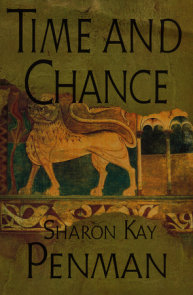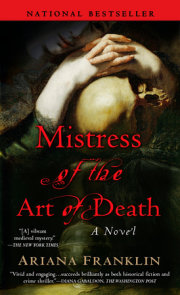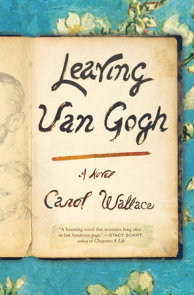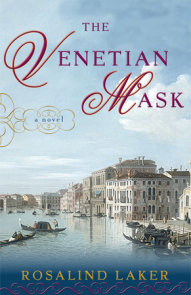READERS GUIDE
Questions and Topics for Discussion
INTRODUCTION
In Sovereign, the third Matthew Shardlake mystery, Shardlake and his loyal assistant Jack Barak undertake a laborious and dangerous mission on behalf of Archbishop Cramner. As the novel begins, Shardlake and Barak must hastily travel to York in advance of Henry VIII’s royal progress to prepare petitions from the city’s leaders. Just five years earlier, Henry had brutally suppressed a rebellion against his dissolution of the area’s wealthy monasteries and priories. The Pilgrimage of Grace, as the rebellion was called, ended when Henry reneged on his promise to meet some of the rebels’ demands and instead had them hunted down and executed. One of the first things Shardlake sees upon arriving in York is the decaying skeleton of the rebel Robert Aske, hanging as a reminder of Henry’s awesome and fierce power. The purpose of the royal progress, following the discovery of a fresh conspiracy in the north, is to consecrate the city’s submission to the crown with a public ceremony of supplication. In addition to the petitions, Shardlake is also charged with ensuring the safe transport of a dangerous conspirator from York to the Tower of London. York, as Shardlake quickly discovers, is made up of an inharmonious mix of “southron” officials who were sent to oversee the dissolution of church lands and prepare for the king’s arrival, and a suspicious and hostile local population.
Shardlake is by no means compelled to undertake such a dangerous mission. He is motivated by financial and filial reasons, namely, to pay off the debts owed on the farm of his recently deceased father. This clearing of his father’s debts is one way for Shardlake to make up for being absent at his father’s deathbed. Filial obligations and relationships are central themes throughout Sovereign. For instance, Giles Wrenne’s hazardous and energetic search for the truth of the tangled lines of his and the king’s families is in part to make amends for rejecting his father’s account of this history. Sergeant Leacon confronts Shardlake on behalf of his father, who has been evicted from his land as a result of a lawsuit successfully argued by Shardlake himself. Even the cruel jailer Radwinter in a perverse way feels he is honoring his father’s memory by upholding “God’s law” in the violent and zealous manner that he does. The illegitimate Tamasin Reedbourne is consumed by a desire to know who her father is, rumored to be a nobleman. The discovery of his identity (not of royal blood) in London and his lack of interest in knowing his daughter is a crushing disappointment to her. Finally, at the core of the novel’s plot is a mystery, based in fact, about the legitimacy of the king. Is Henry, in fact, the grandson of a lowly archer?
While it is filial and financial reasons that send Shardlake to York, it is his stubborn passion for truth and justice that set him on a perilous quest to penetrate the several mysteries he finds there, a quest that eventually lands him in the Tower under suspicion of conspiracy. Despite the threats to his own life, he cannot but seek out the answers to many questions haunting the city. Who is trying to kill the prisoner Broderick (or assist in his suicide)? Who murdered the glazier Oldroyd and what is the meaning of his dying words and the documents in his stolen box? Is the queen foolishly enjoying a risky dalliance with Thomas Culpeper, a royal servant, or with Dereham, her secretary? Along the way, Shardlake’s loyalty to the crown and his work is seriously tested as the rumors grow thick about Henry’s illegitimacy, as the consequences of his brutal reign in the north are revealed, and, especially, as Henry unnecessarily humiliates Shardlake before a public gathering of city leaders. In addition, Jennet Marlin, to whom Shardlake is becoming strangely attracted, delivers a stinging reproach that the lawyer is serving no one but land hungry southern officials. It is an accusation he is unable to answer. Shardlake manages, of course, to uncover the truth behind many of the crimes and conspiracies threatening his life and the peace of the kingdom. However, in the end he must abandon two unresolved matters: the Bealknap case, in which his formidable nemesis Richard Rich is accused of unjustly augmenting his lands, and the mystery of Henry’s legitimacy, the truth of which could thrust England into another period of religious and political violence. Shardlake learns that he must more carefully select his fights and that revealing the truth is not always in the best interests of peace and justice.
C.J. SANSOM
After a career as an attorney, C. J. Sansom now writes full time. His previous novels include Dissolution andDark Fire, both Matthew Shardlake mysteries, and Winter in Madrid, a thriller set around the Spanish Civil War. He lives in Brighton, England.
A CONVERSATION WITH C.J. SANSOM
Q. A number of reviewers have compared your Shardlake novels with the work of Umberto Eco, especially The Name of the Rose. How do you feel about such comparisons? Is Eco an influence on your fiction?
A. I am very flattered by the comparison. The Name of the Rose is a marvelous book, and one of those that seeps into the mind and must influence one’s writing. But apart from Dissolution, which is set in a monastery, none of the other books is set in a “closed” environment but rather in cities with plots set around the politics of the court. One thing all my books have in common is the struggle between reason and compassion (personified by Shardlake) and the competing religious fundamentalisms of his day—by which I mean doctrines that put versions of faith first while putting people and human values a poor second, and believe that doing such is what God intends.
Q. Shardlake is often viewed with suspicion if not outright hostility by many of the characters in Sovereign. This, of course, is due to his being a hunchback and a “southron,” but also to his being a member of the professional class. Do we know how lawyers were generally regarded by both commoners and nobility in sixteenth-century England? Are there parallels with the often negative views (at least in America) of lawyers today?
A. Lawyers seem to have been viewed as greedy parasites on people’s misfortunes throughout the ages, and they certainly were in Tudor times, when litigation was growing. But more often than people think, there is a concern to do justice. (I would say that, wouldn’t I?)
Q. During the gruesome Tower episode, Shardlake screams out that “torture is illegal in England.” I think many readers will find this statement surprising in that it occurs in a novel set in a time of widespread religious persecution. What is the legal provision, if any, behind his statement?
A. Torture was illegal in England, though sometimes practiced, until Tudor times. This was a contrast to the rest of Europe. Henry VIII, completely ruthless and faced with widespread opposition to his religious policies, legalized it in cases of treason.
Q. A related question: Radwinter, Maleverer, Jacob Rawling, and Shardlake, among others, all profess different views about the use and effectiveness of torture. In dramatizing the debate as you did in the novel, did you have in mind the fairly recent scandals in Abu Ghraib and Guantánamo Bay? Have our views of torture changed much since the Reformation?
A. I think the use of torture as a routine policy instrument by Stalin and Hitler so horrified the world that it was outlawed in international law. I wasn’t consciously thinking of Abu Ghraib and Guantánamo when I wrote Sovereign, but quite possibly it influenced me subconsciously. Abu Ghraib was bad enough but the chilling thing about Guantánamo is that practices that clearly constitute torture were given official sanction. Worse, they have a vengeful flavor about them. States do not have the right to indulge themselves in that way.
Q. One of the fine set pieces in the novel is the arrival of the king’s progress to the north. The sheer spectacle of it all puts one in mind of the modern staged spectacles in Las Vegas. With reference to the progress and to the Field of the Cloth of Gold, could you speak briefly about the function of pageantry in the courts of late medieval and Renaissance Europe?
A. This would take a book to deal with properly! In contexts like the 1541 progress, pageantry was used by rulers, and particularly by Henry VIII, to impress and intimidate the commoners with the ruler’s wealth and power, expressed in beautiful clothes of the finest fabrics, jewelry, a huge retinue, and expensively staged events. Display was also used competitively between rulers, as between Henry and the king of France at the Field of the Cloth of Gold.
Q. Ford Madox Ford’s underappreciated trilogy, The Fifth Queen, focuses on roughly the same period in English history as you do in Sovereign. Have you read the trilogy and, if so, did it provide you with any help in fictionalizing the period? Catherine Howard, though not a major figure in your novel, is certainly not the tragic and moving queen of Ford’s trilogy. Does history reveal her to be a young and careless woman overwhelmed by the circumstances of her position or is she something greater than that?
A. I’m ashamed to admit I haven’t read Ford. I must. The problem with Catherine Howard is that there is very little evidence about her, but my reading is that she was young, highly sexed, and politically naïve. She was a political pawn and her execution was a tragedy.
Q. As you indicate in the historical note and acknowledgments, most of the novel is based in fact. What liberties, if any, did you take with the historical record? Did you embellish the threats to Henry’s reign presented by the Titulus Regulus document or the Mouldwarp curse?
A. In the next book, Revelation, which I’m writing now, he will not be returning to a political mission, but Shardlake and Cranmer will have a common interest in hunting what today we would call a serial killer
Q. Sovereign dramatizes the intense hostility between the ruling south and subjugated north. Does this historical period still influence relations between the two regions today or has all been forgiven and forgotten?
A. The Tudor conflict is largely forgotten. It was largely a conflict between Christian factions; thankfully, most play relatively little role today in England. But the north of England has been far less prosperous than the south since Thatcher’s deindustrialization in the 1980s, and the relative prosperity of the south is resented.
Q. Some have suggested that the Islamic world is undergoing its own violent Reformation/Counter-Reformation, similar to what occurred in sixteenth- and seventeenth-century Europe. Has your research in the period helped you to better understand certain religious conflicts today?
A. Sadly I think all religions go through periods of expansionist, fundamentalist brutality and this age is one when currents of dangerous fundamentalism seem to be expanding in all religions—Islam, Hinduism, Judaism, and not least Christianity. In Tudor times the conflict was between religious factions. Today it is between those who believe in an absolutist interpretation of the scriptures of the various religions and those who do not.
The tragedy is that fundamentalism is not interested in the real problems of real people outside the charmed circle of believers, and is frequently quite happy to envisage those outside the circle being brutally destroyed, as is the case with the “End-timers” in modern Protestant fundamentalism. Islamic terrorism goes a (very large) step further, actively destroying people identified as enemies and heretics. Both groups, however, believe that the world is divided between those who have true doctrine and those who do not, and the latter do not matter except so far as some may be converted. That’s my take.
DISCUSSION QUESTIONS






















